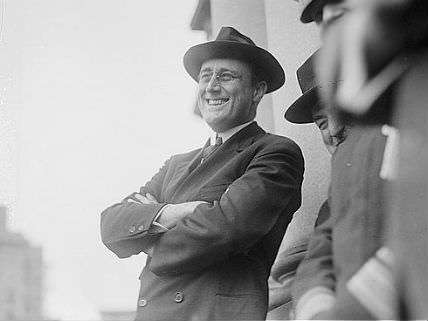Today in History: Franklin Roosevelt Tries to Pack the U.S. Supreme Court
Remembering the lessons of FDR's executive overreach.

On this day in 1937 President Franklin Roosevelt introduced his notorious plan to pack the U.S. Supreme Court. According to FDR, the greying Court had become out of touch with "changed conditions" and "the needs of another generation." His plan was to completely reorganize the federal judiciary by granting himself (and all future presidents) the power to appoint one new federal judge to match every sitting judge that had served at least 10 years and had not retired or resigned within six months of turning 70. Specifically, FDR would get to add as many as 44 new federal judges and, most important to him, up to six new Supreme Court justices.
In my recent book Overruled: The Long War for Control of the U.S. Supreme Court, I discussed how FDR's scheme came to meet its well-deserved end. Notably, Roosevelt's biggest opponents in the Court fight turned out to be progressive leaders such as Justice Louis Brandeis and Democratic Sen. Burton K. Wheeler of Montana. Here's an except from Overruled on the court-packing plan:
It was no secret to anybody what Roosevelt's true motives were. He wanted to appoint a fresh slate of liberal justices who were ready, willing, and able to practice judicial deference and uphold future New Deal legislation.
Unfortunately for the president, the plan backfired spectacularly. Brandeis, offended at both the personal insult and the frank attack on the independence of the judiciary, maneuvered behind the scenes to bring about the bill's defeat. Most significantly, he put the bill's chief congressional opponent, Democratic Senator Burton K. Wheeler of Montana, in touch with Chief Justice Charles Evans Hughes, who had prepared a memo, signed by himself, Brandeis, and Justice Willis Van Devanter, testifying that the Supreme Court was completely on top of its workload and was in no need of any young blood to pick up the non-existent slack. During testimony on the court-packing proposal before the Senate Judiciary Committee, Senator Wheeler unveiled that memo to great effect. Thwarted by such legislative maneuverings, not to mention by the broad public opposition to his apparent tinkering with a co-equal branch of government, Roosevelt failed to garner the necessary votes and the court-packing plan went down to defeat in the Senate.
It's often forgotten today that a number of influential liberals of the 1930s came out against FDR's executive overreach. In addition to Brandeis and Wheeler, there was also Al Smith, the legendary New York Progressive who accused the New Dealers of betraying the Democratic Party in favor of socialistic government. "It is all right with me if they want to disguise themselves as Norman Thomas or Karl Marx, or Lenin, or any of the rest of that bunch," Smith famously declared of FDR and his brain trusters, "but what I won't stand for is to let them march under the banner of Jefferson, Jackson, or Cleveland."
Smith's main objection to the New Deal was not its progressivism; Smith objected to the massive centralization of power in Washington. A committed foe of alcohol prohibition—a "wet" in the political parlance of the day—Smith had been outraged by the damage done under the 18th Amendment. Prohibition, Smith wrote in 1933, "gave functions to the Federal government which that government could not possibly discharge, and the evils which came from the attempts at enforcement were infinitely worse than those which honest reformers attempted to abolish." As biographer Christopher Finan later observed, Smith "began to believe that the danger of giving new power to the federal government outweighed any good it might do."
For more on the New Deal and its discontents, check out the following articles from Reason's archives:
- The New Deal Made Them "Right." Remembering FDR's principled liberal opponents.
- A Switch in Time Saves Nine. FDR's court-packing plan and the temptations of executive power.
- Bad Deal. How FDR made life worse for African Americans.


Show Comments (51)